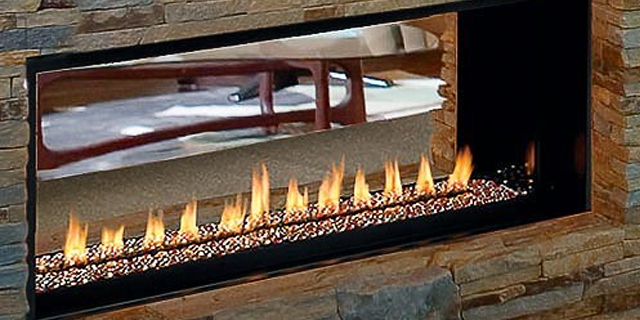Many homeowners that are looking for the traditional feel of a fireplace but not the hassle opt for a gas fireplace. A gas fireplace eliminates the need to handle firewood, clean out ashes, and building a fire each of which take up a lot of time and is not possible for all families. The fact the a gas fireplace is environmentally friendly is also making them more popular among homeowners.
When you have a wood burning fireplace the need for maintenance is pretty obvious but with a gas fireplace many homeowners forget that there is still a need for maintenance and cleaning. Today we are going to talk about 4 tips for maintaining a gas fireplace.

Annual Professional Inspection
First and foremost, it is most important to have your fireplace inspected annually by a gas professional. This should include all of the gas lines, working parts, and the chimney flue or exhaust. Sure these inspections can be costly for the top to bottom inspection but look at the alternative! Is it worth running that risk? I would say not.
Making sure that the entire gas fireplace system is functioning properly and remains sound is only going to save you money in the long run. If you pass the inspection then you know you are not leaking gas anywhere or loosing heat up the flue. You will also be able to sleep better at night knowing that your family is safe.
Keep the Gas Fireplace Clean and Tidy
Wood burning fireplaces are not the only fireplaces that need regular cleanings. A gas fireplace requires cleanings as well. Gas logs are going to develop a soot layer on them from the flame hitting the logs. To clean this off you will remove the logs once they are cooled off, take them outdoors, and brush the soot off using a paintbrush or wisk broom. It is not recommended to wash the ceramic gas logs with water or chemicals as this could cause discoloration of the logs. It could also create a cracking hazard if you burn too soon after washing.
The glass doors on a gas fireplace will also need to be cleaned usually about once a month because they too will develop a thin layer of soot from the flame. This goes for the chimney exhaust too. You should not forget about cleaning the venting pipe. Even though it is gas it will build up a layer of soot that could potentially cause a chimney fire to ignite if left alone.
Ensure a proper ventilation system
Take the time before burning in your gas fireplace to look through the venting system. You want to make sure that there are not any blockages that will prevent it from exhausting. If there is a blockage it should be removed right away.
While a gas fireplace does not let off the amount of emissions as a wood fireplace but they still need an operating venting system to exhaust the let off from the ceramic gas logs. If the unit is vent free then you can burn it with the damper closed.
Shut Down in the Off Season
Just as a traditional fireplace the gas fireplace will not be needed year round. During the warmer months or off season the unit should be shut down completely. This would mean that the pilot is off and so is the gas supply. You should also block off the ventilation pipe as cool air could escape out the exhaust during the summer months. If you are only using the gas fireplace occasionally during the heating season you could lose heat up the chimney.
I hope that you have found these tips to be helpful but if you still have questions about gas fireplaces please leave a comment with your question and I will be sure to respond as promptly as possible.







